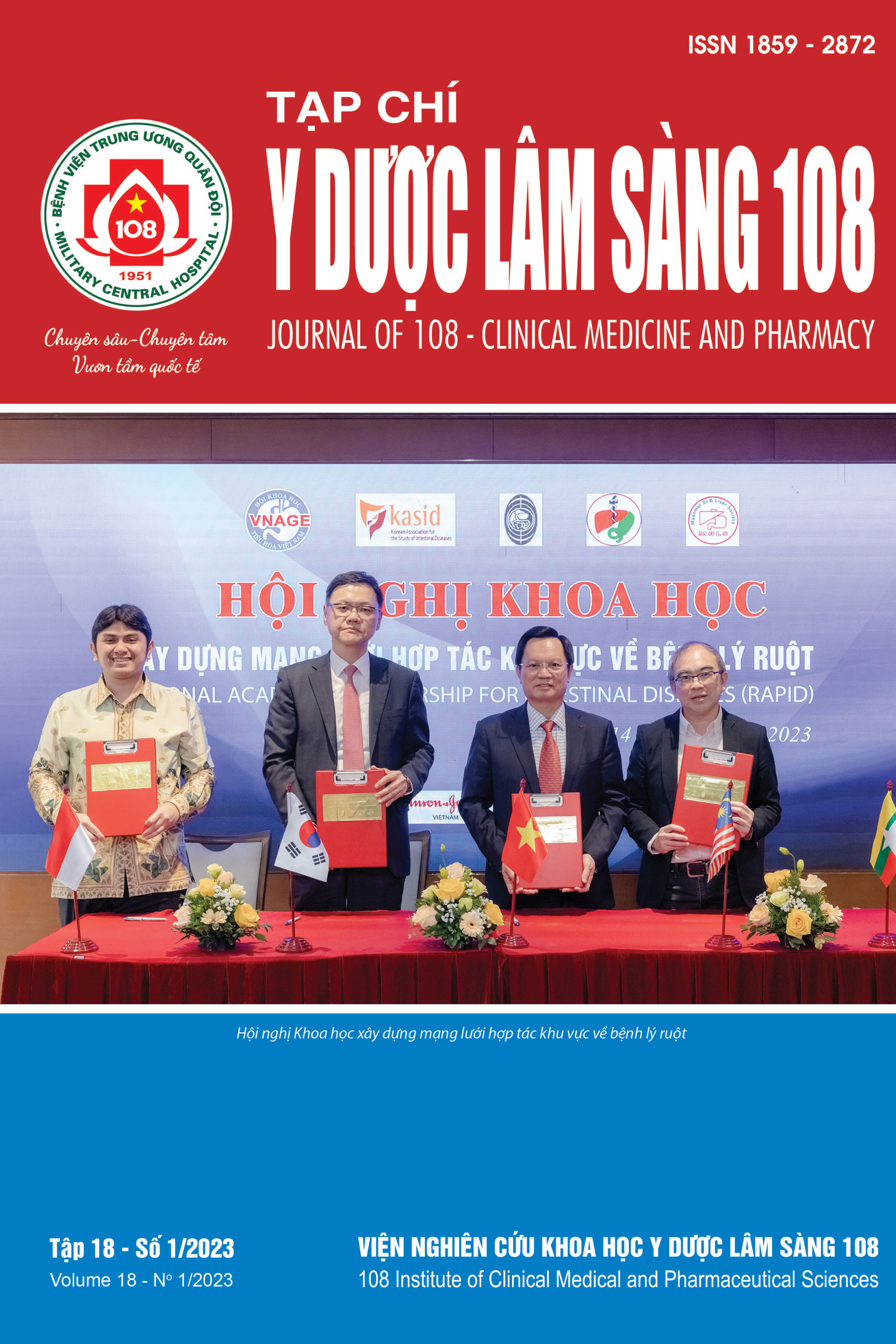Study of microsatellite instability in colorectal adenocarcinoma by immunohistochemistry
Main Article Content
Keywords
Abstract
Objective: To identify features of microsatellite instability in colorectal adenocarcinoma. Subject and method: A retrospective, descriptive, cross - sectional study was performed on 79 patients with colorectal adenocarcinoma treated by immunohistochemistry at the 103 Military Central Hospital from January 2020 to April 2022. Result: 26.58% of colorectal adenocarcinoma patients suffered microsatellite instability, of which the majority lost the expression with immunohistochemical markers of MLH1-PMS2 (61.19%) and MSH2MSH6 (23.81%). Only 2 patients lost expression with MSH6 marker, and 1 patient lost expression with PMS2 marker. A statistically correlation (p<0.05) was found between microsatellite instability and different groups of patients with studied characteristics relating location, size, histopathological subtypes, or histological grade. Conclusion: The status of microsatellite instability is essential in the classification and treatment of colorectal cancer patients, especially under the common adenocarcinoma group.
Article Details
References
2. Richard GF, Kerrest A and Dujon B (2008) Comparative genomics and molecular dynamics of DNA repeats in eukaryotes. Microbiol Mol Biol Rev 72(4): 686-727.
3. Cunningham JM, Kim CY, Christensen ER, Tester DJ, Parc Y, Burgart LJ, Halling KC, McDonnell SK, Schaid DJ, Walsh Vockley C, Kubly V, Nelson H, Michels VV and Thibodeau SN (2001) The frequency of hereditary defective mismatch repair in a prospective series of unselected colorectal carcinomas. Am J Hum Genet 69(4): 780-90.
4. Nguyễn Văn Chủ (2019) Đánh giá sự mất ổn định vi vệ tinh trong ung thư đại trực tràng bằng hóa mô miễn dịch.
5. Williams DS, Mouradov D, Newman MR, Amini E, Nickless DK, Fang CG, Palmieri M, Sakthianandeswaren A, Li S, Ward RL, Hawkins NJ, Skinner I, Jones I, Gibbs P and Sieber OM (2020) Tumour infiltrating lymphocyte status is superior to histological grade, DNA mismatch repair and BRAF mutation for prognosis of colorectal adenocarcinomas with mucinous differentiation. Mod Pathol 33(7): 1420-1432.
6. Zwaenepoel K, Holmgaard Duelund J, De Winne K, Maes V, Weyn C, Lambin S, Dendooven R, Broeckx G, Steiniche T and Pauwels P (2020) Clinical Performance of the Idylla MSI Test for a Rapid Assessment of the DNA microsatellite status in human colorectal cancer. J Mol Diagn 22(3): 386-395.
7. Capper D, Voigt A, Bozukova G, Ahadova A, Kickingereder P, von Deimling A, von Knebel Doeberitz M and Kloor M (2013) BRAF V600E-specific immunohistochemistry for the exclusion of Lynch syndrome in MSI-H colorectal cancer. Int J Cancer 133(7): 1624-1630.
8. Ismael NE, El Sheikh SA, Talaat SM and Salem EM (2017) Mismatch Repair Proteins and Microsatellite Instability in Colorectal Carcinoma (MLH1, MSH2, MSH6 and PMS2): Histopathological and Immunohistochemical Study. Open Access Maced J Med Sci 5(1): 9-13.
9. Liang Y, Cai X, Zheng X and Yin H (2021) Analysis of the clinicopathological characteristics of Stage I-III colorectal cancer patients deficient in mismatch repair proteins. Onco Targets Ther 14: 2203-2212.
10. Seppala TT, Bohm JP, Friman M, Lahtinen L, Vayrynen VM, Liipo TK, Ristimaki AP, Kairaluoma MV, Kellokumpu IH, Kuopio TH and Mecklin JP (2015) Combination of microsatellite instability and BRAF mutation status for subtyping colorectal cancer. Br J Cancer 112(12): 1966-1975.
11. Kaur G, Masoud A, Raihan N et al (2011) Mismatch repair genes expression defects & association with clinicopathological characteristics in colorectal carcinoma. Indian J Med Res 134: 186-192.
 ISSN: 1859 - 2872
ISSN: 1859 - 2872
